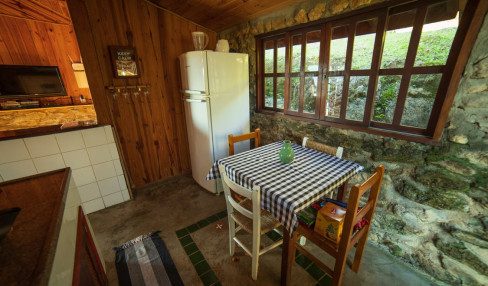Reducing Your Average Household Energy Consumption
6 Mins Read
Published on: 10 June 2022
Last Updated on: 30 April 2025

- How Can We Reduce Our Energy Consumption?
- These Approaches For Energy Saving Are Discussed:
- 1. Change Your Daily Energy Use
- 2. Cut Your Water Heating Expenses
- 3. Change Your Light Bulbs
- 4. Install a Programmed Thermostat
- 5. Purchase Energy-Efficient Appliances
- 6. Insulate Your Home
- 7. Install Energy-Saving Windows
- 8. Winterize Your Dwelling
- 9. Launder Your Garments in Cool Water
- 10. Make Use of Daylight
- Therefore, Why Do We Seek To Reduce Residential Energy Consumption?
- Wrapping Up! The Energy Consumptions
With this year’s increased cost of living, there has never been a better way to reduce energy expenses and help the environment with lower CO2 emissions.
Here you will get the whole ideas about it.
How Can We Reduce Our Energy Consumption?
One approach to lower energy use is to use energy-efficient gadgets and utilities. These would include LED lamps and the use of superior insulation. But, adding these elements to existing homes is costly.
Modern homes would agree since these are already installed at newly built properties.

Yet, in the long run, you would see the staggering results with how such devices knock off a huge amount of your energy bills. You have to see the household energy consumption chart first. Then you will find the areas where you can cut the budget for energy consumption.
It does not cost anything to decrease energy waste, such as heating an empty home or room or keeping the lights on when you are gone, regardless of the age of your property. Click and check out a few easy steps that can go a long way toward energy and money savings.
Each of these approaches for energy-saving and the average household energy consumption is discussed in detail below.
These Approaches For Energy Saving Are Discussed:
Overview:
- Change Your Daily Energy Use
- Cut Your Water Heating Expenses
- Change Your Light Bulbs
- Install a Programmed Thermostat
- Purchase Energy-Efficient Appliances
- Insulate Your Home
- Install Energy-Saving Windows
- Winterize Your Dwelling
- Launder Your Garments in Cool Water
- Make Use of Daylight
1. Change Your Daily Energy Use
It would help if you got energy-efficient equipment to cut your home’s energy usage and boost energy savings. Energy-saving may be accomplished by turning off lights and appliances when not in use.
Turning off lights and appliances when they are not being used can help save energy, instead of using a dryer and hand-washing your dishes.
First, turn down the heat of your thermostat in the chili winter and use your air conditioner less during the hot summer are the changes in behavior with the most potential to reduce utility costs.
The most significant savings come from the amount and frequency of heating and cooling. This is because heating and cooling devices make up about half of a typical home’s utility costs.
2. Cut Your Water Heating Expenses
Water heaters account for a significant part of your total energy use. There are three other ways to lower your water bill. Besides a water heater, it will reduce the average household energy consumption.
These are:
- Using less hot water
- Lowering your water heater’s thermostat
- Insulate the first six feet of your hot and cold water pipes.
For example, tankless water heaters save energy, but they aren’t suitable for large households because they can’t handle many hot water needs at once.
3. Change Your Light Bulbs
Traditional light bulbs, which are incandescent, consume too much electricity, and these must be replaced more often than using their energy-efficient counterparts.
Although energy-efficient light bulbs are more expensive, lower average household energy consumption and longer lifespans result in lower long-term costs.
4. Install a Programmed Thermostat
A programmable thermostat may be turned off or reduce heating and cooling while you are asleep or gone. You can save money on energy without replacing your HVAC system by installing a programmable thermostat.
Several varieties of programmable thermostats may be configured to accommodate your weekly schedule. Programmable thermostats can work better by adding lights that show when air filters need to be changed or when there are problems with the HVAC system.
5. Purchase Energy-Efficient Appliances
Appliances account for around 13 percent of the average household’s energy use. When buying a home appliance, you should think about how much it costs to buy and how much it costs to use each year.
Look for the ENERGY STAR logo when choosing an energy-efficient appliance. This is a guarantee from the government that the device will use less average household energy consumption in standby mode than standard models.
Think about getting a home warranty as well so your appliances are covered in case of a breakdown. We can lose out on a lot of money if we pay out of pocket. Obtaining a Texas home warranty plan, or similar, is a good way to stay on top of things and be aware of your finances.

6. Insulate Your Home
Insulation is a vital part of lowering your average household energy consumption bills because it keeps heat in during the winter and keeps heat out during the summer.
Depending on where you live, the required heat resistance for your insulation may vary. In warmer places, like the South, the acceptable value of resistance is lower than in colder areas, like the Northeast.
7. Install Energy-Saving Windows
Windows significantly contribute to energy waste. Replace single-pane windows with double-pane windows to decrease heat loss via windows.
Also, interior or exterior storm windows can cut heat loss by 10 to 20%. Consider storm windows in particular if your site gets regular harsh weather. In warmer areas, window heat gain may be an issue.
Blinds, shutters, screens, and awnings can also add a layer of insulation between your home and the outside, which can help you save even more on average household energy consumption.
8. Winterize Your Dwelling
Sealing air leaks in your home is an excellent way to save expenses on heating and cooling. Air leakages occur in house vents, windows, and doors. To avoid these leaks, verify no cracks or gaps between the wall and the vent, window, or doorframe. Air leaks between immovable objects, such as the wall and window frame, can be sealed with caulk.
Apply weatherstripping to gaps between moving items, such as movable windows and doors. The return on investment for weather stripping and caulking is often less than one year.
Air can also escape via holes in the wall, floor, and ceiling caused by plumbing, ductwork, or electrical wires. Usually, air leaks inside your home into the attic through small gaps. Hot air will rise and exit through small holes through ducts, light fixtures, or the attic hatch.
9. Launder Your Garments in Cool Water
Laundry is an integral part of the weekly routine for most households. When warm water is used, it is also an energy-intensive process. In reality, most energies used when washing clothes go toward heating the water.
There are some possible financial benefits to using cold water. For example, customers can save more money by lowering the temperature of their washing water. People have even said that washing clothes in cold water could make them last longer without hurting them.
10. Make Use of Daylight
Lighting takes up a big chunk of energy costs, and using the sun is an obvious way to cut down on energy use. It is preferable to have windows facing north and south. This allows for more glancing light, generating heat and reducing harsh winter light. While east and west-facing windows allow for more direct sunshine, they do not let in as much heat.
Therefore, Why Do We Seek To Reduce Residential Energy Consumption?
Using energy should be carefully thought about because our actions affect the environment and the poor.

We recall the devastation created by the exploitation of fossil fuels. In particular, coal mining, inefficient power plants, human health difficulties in polluted cities, greenhouse gas emissions, and climate change.
We are starting to realize that our desire to use more energy from global extraction is a threat to all living things, including us.
Wrapping Up! The Energy Consumptions
When we cut back on how much energy we use, we protect natural landscapes, stop using fossil fuels for no reason, cut pollution, and make climate change less severe. In addition, conserving energy can save you money in fluctuating energy costs. These are the tips. By following these, you can control the average household energy consumption. So what are your challenges? Let us know through the comment section.
Read Also:


















Comments Are Closed For This Article